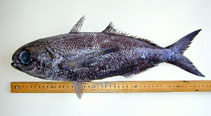| Family: |
Nomeidae (Driftfishes) |
| Max. size: |
127 cm TL (male/unsexed) |
| Environment: |
pelagic-oceanic; marine; depth range 165 - 400 m |
| Distribution: |
Eastern Central Pacific: USA. Eastern Central Atlantic: Mauritania. |
| Diagnosis: |
Dorsal spines (total): 10-10; Dorsal soft rays (total): 24-24; Anal spines: 3-3; Anal soft rays: 20-23. Description: D X,24; A III,23 V 7, sp.br. 11 + 1 + 18 (29), amount of caudal fin rim rays 9-11 (table); small scales, easily falling (103 scales go along lateral line of body); snout top (higher than nostrils) and preorbital space without scales; original 'high temples'; body elongated, its height fits within SL approximately five times, and head length fits into SL 3.3 times and is larger than body height; snout relatively long and fits within head length three times; small eye, its diameter fits 5.6 times within head length and 1.9 times within snout length; small mouth; end of upper jawbone does not reach vertical of eye diameter; teeth at vomer and tongue not visible; with palatine teeth; deep groove exists between abdominal and proctal fins; long pectoral fin, its length slightly larger than head length and fits within SL more than three times; antedorsal distance fits 2.8 times within SL; anteanal, 1.7 times; long caudal peduncle, its height fits 1.6 times within length; 9 rays in upper blade of caudal fin; 11 rays in lower blade; gill rakers short, gill raker length fits 2.2 times within gill petal length (Ref. 102053). |
| Biology: |
|
| IUCN Red List Status: |
Not Evaluated (N.E.) Ref. (130435)
|
| Threat to humans: |
harmless |
Source and more info: www.fishbase.org. For personal, classroom, and other internal use only. Not for publication.
